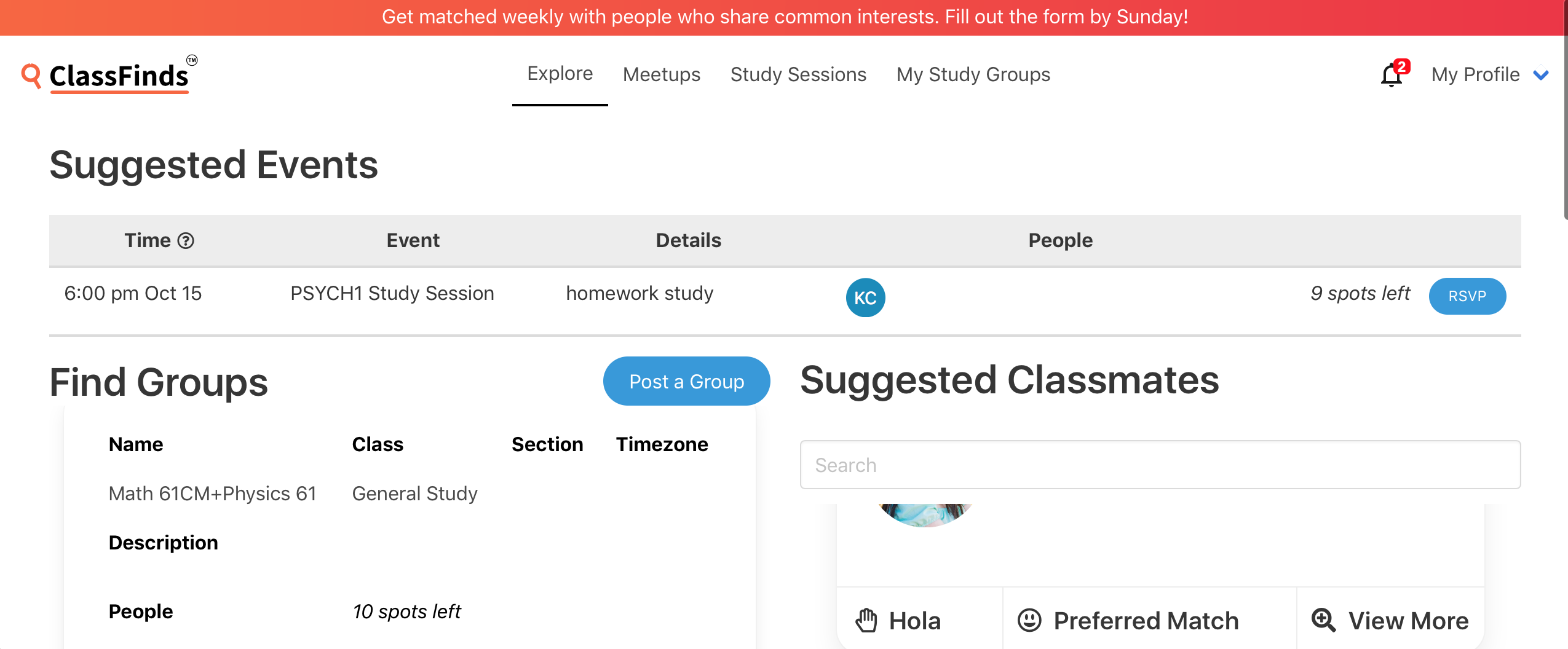COVID-19 and the switch to virtual learning have challenged students across the board — including when it comes to making friends. For Albert Zhang ’23 and Colin Schultz ’23, however, the transition was also an opportunity. Together, Zhang and Schultz founded ClassFinds, a website that helps students study and create connections with one another.
Since early August, the site has grown to almost 3,000 users and is used at seven universities across the United States, including Harvard and Carnegie Mellon University (CMU). Zhang serves as the site’s product manager and designer, while Shultz handles the software and the website.
ClassFinds now also offers services such as meet-ups with other students, study sessions and study groups. Students are also able to fill out surveys that match them with other ClassFinds users who share similar interests.
Zhang was motivated to start ClassFinds after his experiences with remote learning during spring quarter: “I had a pretty tough spring quarter in terms of school, because it was really unmotivating studying by myself all the time,” Zhang said.
Different time zones, missing out on social interaction and not having a set study group were also challenges that Zhang encountered.
Zhang’s difficulties led him to begin interviewing his friends and classmates about their remote learning experiences. His dozens of product interviews inspired him to create his first prototype of ClassFinds, which he launched at CMU in September. Zhang chose to launch ClassFinds at CMU because classes started two weeks before Stanford, allowing him to gauge interest in the website. He also paired up with a friend at CMU who handled the site’s marketing.
Ankush Dhawan ’24 joined ClassFinds to interact more with other students in similar classes.
“A huge part of college culture is studying with others, and when I heard about ClassFinds, I thought that it would be a great way to find other students in similar classes, especially in the virtual environment,” Dhawan said.
One of the defining features of ClassFinds is its focus on fostering peer-to-peer academic support. Zhang found that the asynchronous aspect of other online services for students, such as Canvas and Piazza, made learning impersonal.
Another defining characteristic of ClassFinds are the surveys students can take to get matched with others with similar interests. Annika Mauro ’23 said that these meetings are a great outlet to interact with other students.
“It’s an opportunity to meet people, as if you were just trying to make new friends or meet people that you would work with in your classes but with the assumption that it’s okay if it’s awkward,” she said. “People are just happy to talk.”
While other platforms such as Zoom and Google Meet offer options for more direct contact, Zhang feels they are limited in that they are what he calls “closed interactions.”
“There aren’t really any open Zoom rooms, and groups usually form between people and their close friends,” he said.
ClassFinds, therefore, has its own built-in video system so that anyone in a classroom study group can join without having to dig through their email for a Zoom link.
Students had mixed opinions on how well the site had connected them to other students. While the opportunities to have study sessions on ClassFinds continue to grow, Dhawan doesn’t feel as though he has made many close connections, having not met any students in his classes. Mauro, though, said she’s had good experiences with the meet-ups she has attended so far.
“I like how ClassFinds matches you with groups instead of individuals,” she said. “The fact that it’s focused on creating face-to-face meetings is one of my favorite things about ClassFinds.”
Moving forward, Zhang hopes to continue expanding the services ClassFinds offers. He plans to start more study buddy programs where students are matched with someone who has similar interests to them for weekly study sessions and will continue adding improvements to the website until he has a product he can pilot to other schools.
“The goal is to get to a lot of schools,” Zhang said. “But I think this is something that applies not just to college students but to young adults and other people who are past our age.”
A previous version of this article misspelled Colin Schultz and has been corrected to reflect his name’s proper spelling. The Daily regrets this error.
Contact Anuka Mohanpuhr at anuka ‘at’ stanford.edu.
